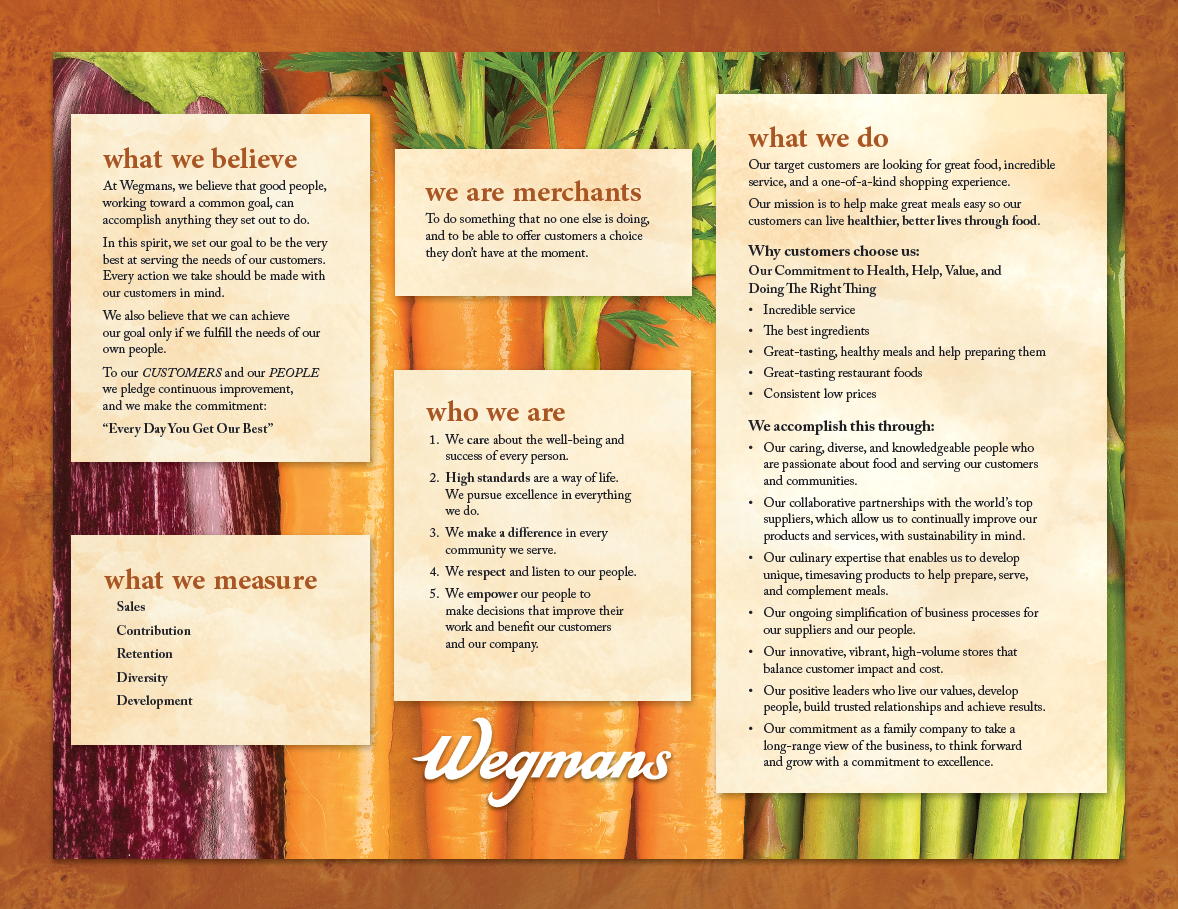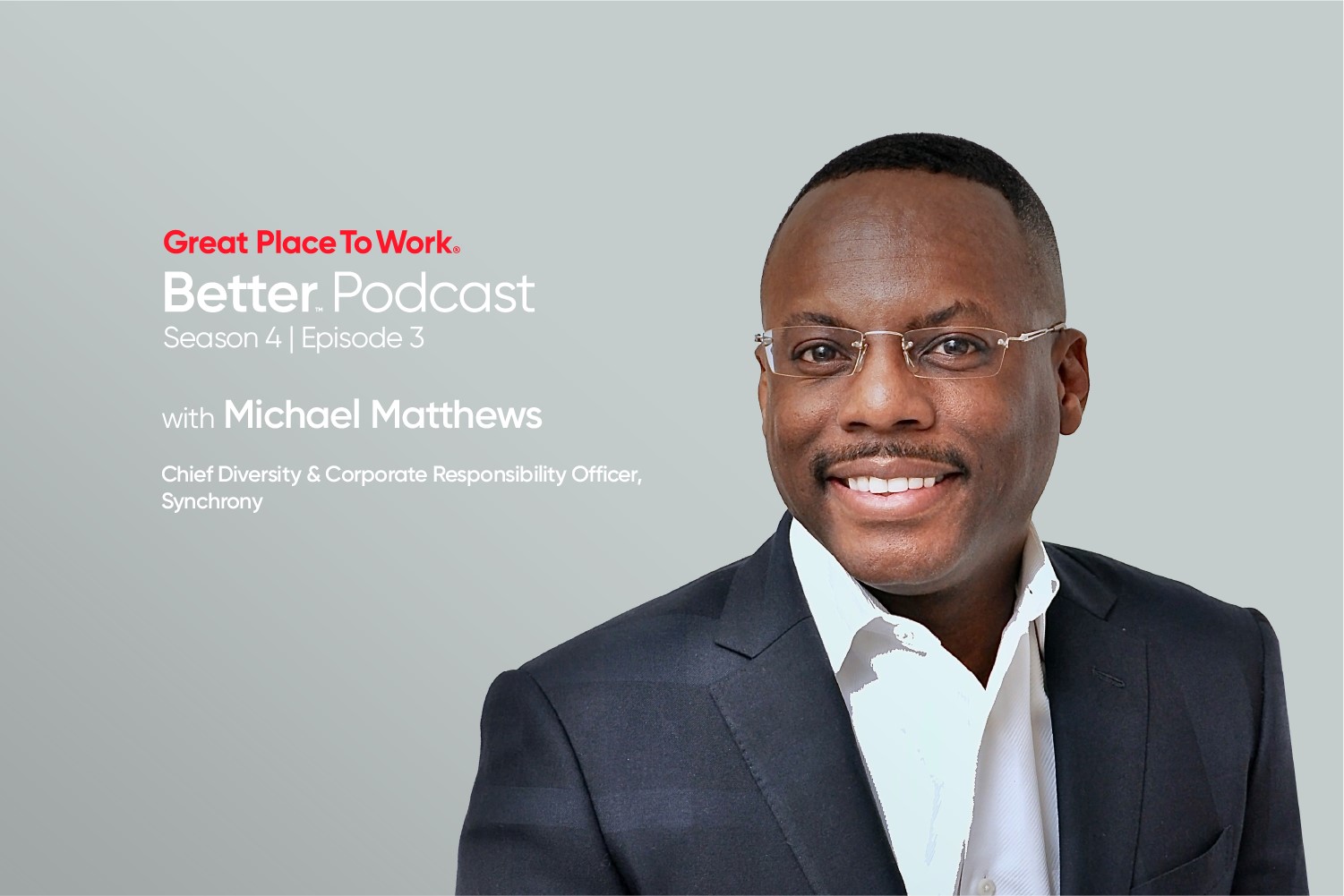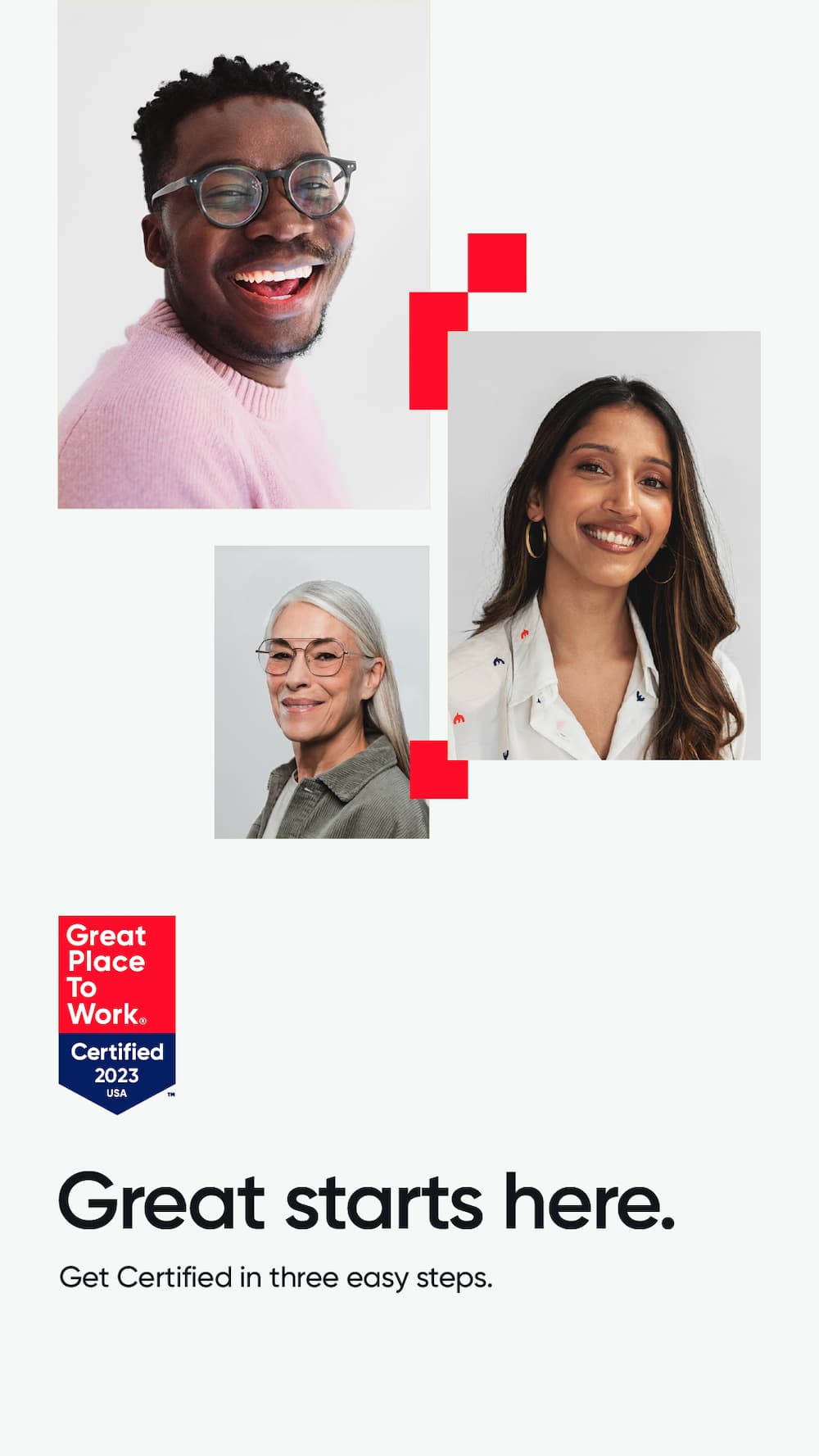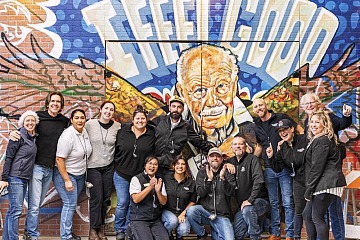Benefits of Company Culture, Best Workplaces, Inspiring, Purpose
With workers leaving behind unfulfilling roles, employers that commit to meaning at work will dominate the market.
In the extraordinary employment reshuffle of the past year and more, people aren’t just leaving jobs. They are leaving industries.
In data from McKinsey, 48% of sampled workers said they would leave their job, not for an industry competitor, but for an entirely different opportunity. The news is sobering for business leaders, even if the economy is heading toward a recession.
No business can succeed if all the best talent walks out the door.
Despite increased economic headwinds, workers still think they might quit their current role. In a July 2022 survey from Great Place To Work® of nearly 4,200 U.S. workers, 55% of workers across seven industries said they are open to leaving their jobs in the next six months.
What industries are at the highest risk for hemorrhaging talent?
According to the same survey, retail and hospitality industries have higher percentages of employees open to leaving their current job (64% and 62% of employees, respectively).
What keeps highly valued employees from leaving the organization? In a word, purpose.
Great Place To Work analyzed the best workplaces across 11 different industries, and meaningful work was a key driver of employee retention in every industry.
The outcome of finding purpose at work? Employees who say their work is more than “just a job” are two to six times more likely to stay with their company long-term.
No business can succeed if all the best talent walks out the door.
Employees at the typical health care organization experience the strongest sense of purpose out of the seven industries measured in our July market study, with 62% reporting meaningful work. The typical retail employee has the weakest connection to purpose, with only 38% reporting meaningful work.
Yet, meaningful work isn’t solely dictated by industry.
For employees at the average company on the Fortune Best Workplaces in Retail™ List, 108% more workers report meaningful work than the typical retail workplace, a difference of 41 percentage points. Even compared to the purpose-driven typical workplace in health care, 23% more employees at the Best Workplaces in Retail report meaningful work (17 points more).
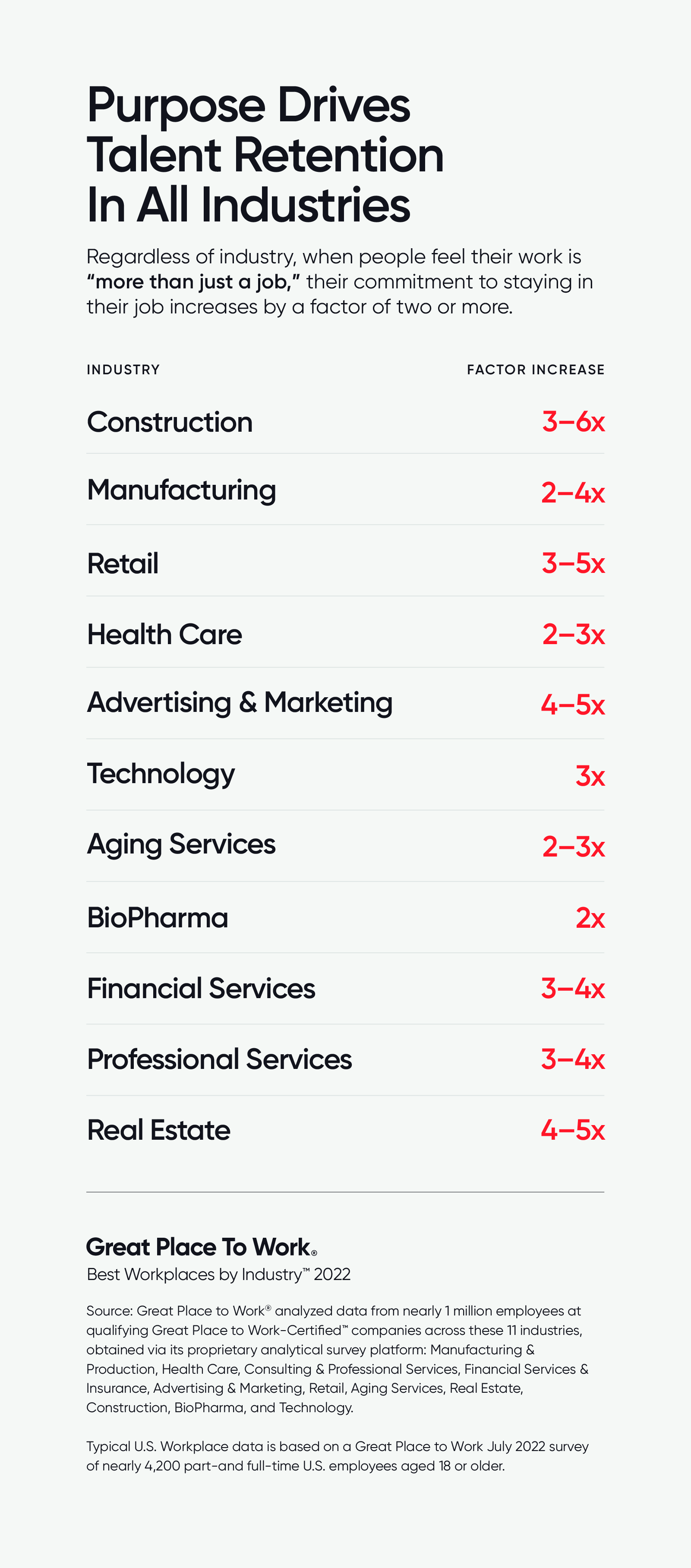
What purpose looks like
Purpose has been shown to be a crucial element for retention across geographic areas and age demographics, too. So, what does it look like in practice?
For AbbVie, No. 2 on the Fortune Best Workplaces in BioPharma™ List for large companies, it isn’t any one thing.
“There are many small factors that lead to engaged employees who are passionate about their jobs,” says Tim Richmond, EVP and CHRO at AbbVie. “But there’s one element that should remain constant — staying true to your convictions.”
For AbbVie, those convictions include “supporting well-being, operating with integrity, driving innovation, transforming lives, serving our community, and embracing diversity and inclusion,” Richmond says.
At Wegmans Food Markets, the No. 1 large company on the Best Workplaces in Retail List, connecting employees with purpose starts with a mission board — what Wegmans calls its W board — which is on display at every workplace. The board communicates the company’s values, explaining what employees can do to contribute to the grocery chain’s overall mission, and the measures every employee can help impact.
“It’s truly lived every day,” says Peggy Riley, vice president of employee communications and engagement.
Brand values such as “Always help others” are constantly reinforced during an employee’s tenure. “We talk about everything on the W board very frequently and specifically, and we integrate it into training, into their performance plans, into everything,” Riley says.
It takes effort to ensure the brand’s mission is accessible to every employee. Language must be chosen carefully.
“We work very hard to ensure the W board is relatable to every employee at all levels,” says Riley. “We don’t have big, fancy, complicated words, or equations. Every single employee contributes to our success.”
Meaningful work is vital in every industry, but the benefits are particularly acute in the fields where McKinsey has identified high rates of employee departures, such as retail and manufacturing.
“There are many small factors that lead to engaged employees who are passionate about their jobs. But there’s one element that should remain constant — staying true to your convictions.” - Tim Richmond, EVP and CHRO, AbbVie
Purpose matters in every industry
In Great Place To Work research, only 38% of employees at an average retail company say their work has meaning. For companies that made the list of Best Workplaces in Retail for 2022, 79% of employees on average said their work was meaningful.
The gap between average and great is large for manufacturing firms, too, with 48% of employees at average companies saying they have meaning at work. For the best? Eighty-three percent.
Yet, no industry can rest easy when it comes to purpose.
Even organizations in health care — an industry with a visible and potent purpose — the average is far outstripped by great organizations. Only 62% of workers at average health care organizations reported meaningful work, compared to 90% at the best.
At KSLD Laser, No. 17 on the Fortune Best Workplaces in Manufacturing & Production™ List for small and medium-sized businesses, demo days offer a chance to show employees the impact of their work.
“Employees can see our products, and hold them, touch them, experience them,” says Amy Hilvers, director of HR for semiconductor laser producer.
The company also connects employees to purpose through its corporate social responsibility program.
“One of our products is a laser flashlight that has a very long beam — very useful to rescue and firefighters,” says Hilvers. “We donated some of our flashlights to firefighters and then received feedback and photos of them using the flashlights in actual rescues.”
Sharing those stories helped workers see how their work was helping to save lives.
The typical retail employee has the weakest connection to purpose, with only 38% reporting meaningful work ... Only 62% of workers at average health care organizations reported meaningful work, compared to 90% at the best.
Purpose requires context
On its own, purpose is not enough to prevent employee turnover. If an employee loves the mission, but feels underappreciated or even mistreated, they’re still likely to find the nearest exit.
Mission-driven industries like health care have more employees who report meaningful work, but struggle in other areas of workplace culture — such as fair pay and promotions. In health care, only 42% of employees at typical organizations report receiving fair pay for their work. Only 41% report fair promotion practices. At companies on the Fortune Best Workplaces in Health Care™ List, those numbers rise to 78% and 81%, respectively.
Fairness is a point of emphasis for companies like AbbVie.
“We know that there is always more to be done around pay equity,” says Richmond. “As stated in our 2021 ESG report, we conduct an annual pay equity analysis to ensure pay is equitable across genders and ethnicities among United States employees.”
The bottom line is that great workplaces can recruit from any industry. They beat out any average employee experience. For leaders worried about talent flocking to more enticing industries, the data shows that their worry is not misplaced — a great workplace culture can compete with anyone.
Subscribe
Improve employee retention and engagement with the latest insights from our data and research team. Subscribe to the Great Place To Work newsletter and learn how to create a great workplace culture.






